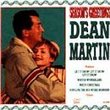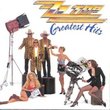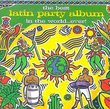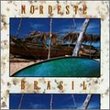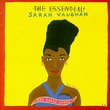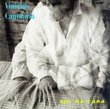| All Artists: Gioachino Rossini, Richard Bonynge, London Symphony Orchestra, Joan Sutherland, John Serge, Joseph Rouleau, Leslie Fyson, Marilyn Horne, Michael Langdon, Patricia Clark, Spiro Malas Title: Rossini: Semiramide Members Wishing: 0 Total Copies: 0 Label: Polygram Int'l Release Date: 10/9/1989 Album Type: Import Genre: Classical Style: Opera & Classical Vocal Number of Discs: 3 SwapaCD Credits: 3 UPC: 028942548121 |
Search - Gioachino Rossini, Richard Bonynge, London Symphony Orchestra :: Rossini: Semiramide
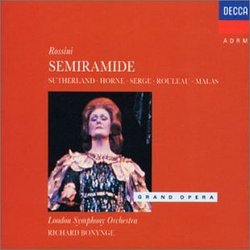 | Gioachino Rossini, Richard Bonynge, London Symphony Orchestra Rossini: Semiramide Genre: Classical
For golden-throated singing, it would be hard to top this classic recording, featuring two great divas at the height of their powers; for a working definition of the term "bel canto," just listen to Joan Sutherland and M... more » |
Larger Image |
CD DetailsSynopsis
Amazon.com For golden-throated singing, it would be hard to top this classic recording, featuring two great divas at the height of their powers; for a working definition of the term "bel canto," just listen to Joan Sutherland and Marilyn Horne as they make coloratura magic. Never mind the male singers in this recording, though; they're adequate, but, then, they're not the point. Sutherland's Semiramide is a tad maternal in her character, but the singing makes up for any shortcomings there, while Horne is clearly having the time of her life as the warrior Arsace. Richard Bonynge conducts optimally for his singers. For many years this was the only recording available of this tuneful if slightly static opera, and for the quality of its singing it's still the first choice. Unfortunately, there are numerous cuts in the score, so critical-edition buffs will have to seek elsewhere, or do without. --Sarah Bryan Miller Similarly Requested CDs
|
CD ReviewsThe most taxing bel canto opera written 06/30/2003 (5 out of 5 stars) "Without Sutherland and Horne, Semiramide would not have been possible. This opera calls for the greatest bel canto technique with incredible high notes and awesome breath support. Sutherland sang this at La Scala to great acclaim while her Arsace Monica Sinclair was booed by the very rude Italian audience. Luckily, in this incomparable recording, the Arsace is the great American mezzo soprano, Marilyn Horne. I think this is Horne's greatest role. She matches Sutherland note for note( only her trill and high notes are inferior to the Dame's ) Like Norma, this opera is all about duets and ensembles. However, the Semiramide duets are many times more diffucult than Norma's, with coloratura are so complicated that even Sutherland herself couldn't believe it was singable. Well, she certainly sang it impeccably. In fact, the two divas added even more difficult cadenzas and second verses to Rossini's already impossible vocal writings. The two of them taking triple trills, 32nd notes, two and a half octace jumps, and fioritura writings so complicated that four pages of it may only represent one minute of singing. A monument to the possibilities of the human voice. You have to listen to it at least once to believe that Sutherland and Horne are invinsible in the art of coloratura singing." Only Sutherland and Horne can attack this opera 07/14/2003 (5 out of 5 stars) "Politics aside. Only Sutherland can sing this most difficult of all of Rossini's roles...This is what the world famous music critic said of Sutherland's Semiramide..."...Semiramide without Sutherland would have been impossible. She brings a great role to life, for she has both the technique for it and the artistic force to use roulades for eloquence. Beyond this there is the thrilling realization that, far from resting on Lucia, she is developing new powers, conquering relative weaknesses; and the technique(unlike Callas in her great days) is so secure that there is every reason to anticipate a long series of increasing triumphs..."Note that he said Semiramide without Sutherland would have been impossible. Politics aside, you need a super voice that is both large and extremely flexible to sing the ridiculously difficult role of Semiramide. Certainly no one in the world at that time could sing it. Not Sills, not Callas. When La Stupenda took on Semiramide in the sold out 3,600 seats in Milan's famous La Scala Opera House - an opera house famous for its picky and sometimes very critical audiences, Sutherland came, sang, and conquered. La Stupenda attacked all her terrifying difficult arias, duets, and trios like a stroll in the park. She throws a high C, D, and E here, there, and everywhere. The great coloratura took on triple trills and long legato passages like it was nothing. The extremely complex and taxing runs and arpeggios are so dead on that it's not even human. The most difficult audience in the world(La Scala's) is hearing a thrilling true dramatic coloratura soprano combined with acting that was far superior to anything that even Sutherland herself had shown before.To make it clear, this is one of the most arduous roles in the entire repertoire. Sutherland, and Horne makes it possible. To hear the possibilities of the human voice and to celebrate the art of bel canto. I highly recommend this essential recording." To the S.Diego person, you need to listen before you reviewe 07/06/2003 (5 out of 5 stars) "You are attacking Sutherland without hearing the performance. This is probably the most spectacular role even Sutherland ever sang, and she has Horne at her side. Sills couldn't sing this even in the shower, the same goes for Callas.
This is the most difficult Rossini opera written. Only Sutherland can sing it. It calls for the greatest dramatic coloratura soprano in the world to do it justice. The reviewer that claims Sills is better is uneducated. Sills is a light coloratura who sings Olympia and the Page in Hugenotts. She has a tiny voice. If she was to attempt Semiramide she would be drown out and not be heard. Having said that, I do enjoy Sills , but she is not in the same league as Sutherland or even Callas. She is in the league with Roberta Peters and Lily Pons. She is not a dramatic coloratura. That is a fact And I feel sorry for the 12 yo who insist that Sills can compete with Sutherland in the bel canto roles who calls for a coloratura soprano who can soar above the most dramatic writing. I know of only two who can do his justice...Sutherland and Callas. But Callas never attemped Semiramide. I think she knew it was above her capabilities. She's smart. In recent history, only Sutherland can sing this fiendishly difficult role. And she has the most awesome partner in the great Marilyn Horne to back her up. To hear the most difficult Rossinian opera ever written, with nice tunes, I highly recommend this Semiramide. No one can touch this in bravura singing. Look at your Schwann catalog!" |

 Track Listings (44) - Disc #1
Track Listings (44) - Disc #1